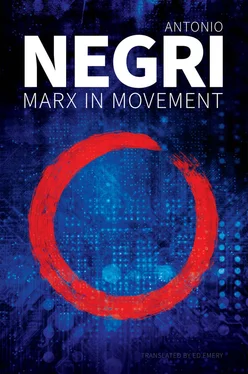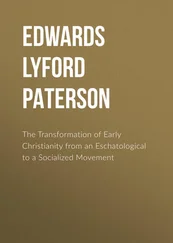By this I mean that real subsumption of labour is a form of the crisis of capital. Understanding real subsumption of labour as crisis is one of the discoveries in store for communism as it goes ‘beyond Marx’.
But this is not enough. In our rejection of postmodern ideologies (without, of course, denying their analytical efficacity), we also retrieve another element of the theoretical history of our Italian movement since the 1960s. Namely, while the ambiguous theory and methodology of the mass worker implied a dialectic of value that today the social worker rejects, there was also articulated therein an inherent practical activity of subversion, a self-valorizing independence (autonomy), which now the social worker lives as his own dignity and essence. Massimo Cacciari, the philosopher of Krisis , cries that, where there is crisis, there is no dialectic. Crisis would not be a form of the dialectic, or rather could be dialecticized only in the form of an Aufhebung – its own transcendence. 1
No, replies the social worker, here there can be no Aufhebung , because here the confrontation is between subjects that are different . In moving from formal subsumption to real subsumption, capital overcomes obstacles, lives the continual reduction of the working class to labour power in terms of a continuous, long-term and progressive socialization of labour – in terms of a transition between class compositions at increasingly high levels of intensity and potential. Once subsumption is completely realized, the only possible development is a transition from socialized labour power to the social worker, to the new class subject. The tradition and theory of the mass worker can still be of help in stimulating us towards this new definition.
4 A political conception of labour power: The proletariat: Some problems
Having reached this point, we can now attempt a summary of some basic methodological assumptions that should help us to reach a partial conclusion and to pose new problems.
To start with, I regard as logically untenable any theory of labour power as a logical construct: an ambiguous and volatile essence, caught in a dichotomy between a tendency to become variable capital (the variable part of organic capital) and a tendency to become working class (i.e. a receptacle for consciousness that derives from the outside, the substance of a new Aristotelian sunolon [whole]). This instrumental and pure logic definition of labour power, which is both abstract and open to manipulation, has, historically speaking, been progressively negated (if I may simplify) through at least three concomitant processes.
The first process is the advance in the organic composition of capital – which, as it internalizes massively labour power’s relation to the structure of capital, at the same time eliminates from it all measure of proportionality in the relationship between the work done by the individual worker and the level of productivity achieved. Labour power as presented within the labour market as a multiplicity of individual labour powers can now be conceived of only as a totally marginal phenomenon.
The second process, which takes the development of the organic composition of capital beyond the scope of the single firm and goes beyond its phenomenological appearance to see it as the realization of the subsumption of social labour under collective capital, has shown labour power to be a social entity. That which is marginalized as an individual becomes transformed, at the social level, into mobility, into an equivalence of abstract labour, into a global potentiality that has in it that generalized social knowledge that is now an essential condition of production.
The third process, concomitant with those of individual marginalization and collective socialization, has brought about a conjunction between (a) the refusal of labour power to make itself available as a commodity (I see this as the effect of individual marginalization and of the collapse of any relationship between ‘job’ and ‘skill’) and (b) the socialization of this mode of class behaviour. I designate this as a ‘third’ process and consider it both innovative and conceptually very rich, since the coming together of individual marginalization and collective socialization is no simple process of addition. Rather it is a historical process, which combines material elements and becomes at the same time subjectivized – in the sense that historical experience becomes transformed into irreversible qualities, into a second nature. Through the genesis of this process, new subjective forces make their appearance.
As a result of these processes, it should now be clear that labour power, at this level of subsumption of social labour by capital, so far from presenting itself as an intermediate entity, suspended between being a function of variable capital and becoming working class, now presents itself as a social subject: a subject that has internalized at the social level its refusal to be a commodity.
At the political and social level, this subject presents a complete materialization of consciousness within the structures of its own existence. Class consciousness, in other words, comes neither from the outside nor from afar: it must be seen as completely internal to a fact, a thing of class composition. The concept of class composition, which was developed originally through the analysis of the mass worker – as a means of classifying changes in the nature of labour power and as a critique of purely logical and economistic characterizations of these changes – can now be updated as a historico-political, subjective social definition of labour power. In view of this, we can appreciate the importance of the theoretical current that developed through the analysis of the mass worker, and above all we can appreciate how the specific antagonistic subjectivity of this class protagonist contributed, through its struggles, to going beyond and overcoming the limitations of the original theoretical conception. It seems to me that the mythical term ‘proletariat’ has been given a historical dimension and has become founded as a specific material reality through the development of this theoretical approach.
Major consequences derive from all this. First, there is a demystification of a number of concepts and practices existing within the traditions of the labour movement. Secondly, in my opinion, important consequences (and, more particularly, problems) arise at the strictly theoretical level, in other words relating to our conceptions of work and communism. Thirdly, not to be underestimated in their importance, we also find indications of method.
Let us take the first point. This social labour power that exists as a political reality, this social worker, this proletariat, embraces within itself so many dimensions, both intensive and extensive, as to render many categories obsolete . In other words, proletarian antagonism (within real subsumption) posits itself on the one hand, intensively, as an irreversibility of the given level of needs that has been arrived at, and on the other hand, extensively, as a potentiality of action, as a capacity to extend action across the entire span of the working day. If we want a tighter conceptual definition, we might say that this socialized labour power not only (a) dissolves any possibility for capitalism to consider it as a commodity, as the variable component of capitalist command for exploitation, but also (b) denies capitalism any possibility of transforming necessary labour into wage and surplus value (absolute or relative) into profit. Clearly profit and wage continue to exist, but they exist only as quantities regulated by a relation of power – a relation of forces that no longer admits the threefold partition of the working day into necessary labour time, surplus labour time, and free time or reproduction time. We now have a labour power that is both social and subjective, that recognizes the value partition of the working day only as a system of command, which capital may or may not succeed in imposing over and against the continuous flow of labour power within the working day. The conditions for the extraction of surplus value now exist only in the form of a general social relation. Profit and the wage become forms of the division of a value content that no longer relates to any specific mechanisms of exploitation other than the specific asymmetry of the relationship of command within society. Capital has the form and substance of profit, as an average, a mediety of command; labour power has the form and the substance of the wage, but in no way can a ‘natural rate’ be said to exist between the two of them. In other words, the mechanism of transformation and mediation that characterizes the Marxian genesis of these concepts has now reached its point of fullest maturity. Exploitation consists in command. It is violence against the antagonism of social subjects that are fighting for liberation.
Читать дальше












